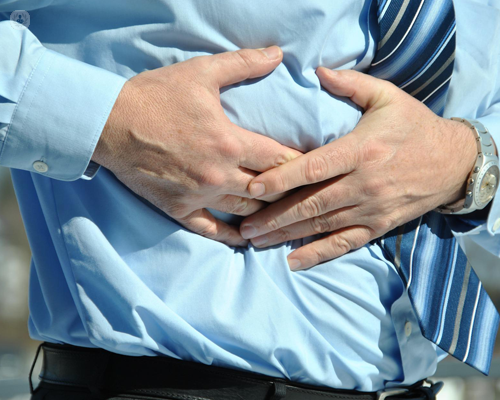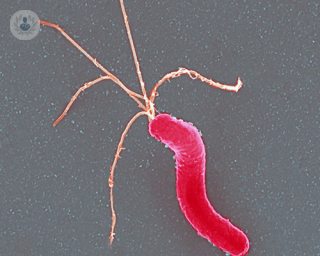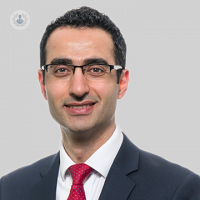What is a stomach ulcer?
A stomach ulcer, which is also known as a peptic or gastric ulcer, is a sore in the mucous membrane that lines the stomach or duodenum, the first segment of the small intestine.
The most common symptom is heartburn, which may happen after eating or during the night, and this can last for several hours.

What are the symptoms of stomach ulcers?
The symptoms of a gastric ulcer vary from person to person, and in some they are asymptomatic. This is especially true of small ulcers. Heartburn is considered to be the most common symptom of peptic ulcers, and it can last between a few minutes to several hours, and can affect the person intermittently for several days or weeks.
Other common symptoms include:
- Feeling full
- Difficulties drinking a normal amount of liquid
- Hunger and feeling empty after eating
- Nausea
- Stomach ache
A gastric ulcer can also cause other less common symptoms:
- Swelling
- Being gassy and burping
- Lack of appetite
- Felling fatigued
- Vomiting
- Chest pain
- Weight loss
- Dark stools
What medical tests are available for stomach ulcers?
Your specialist will ask about the symptoms you're experiencing, your medical history, and they will carry out a physical examination to check if there is swelling and pain the stomach. They will also use a stethoscope to check for any unusual sounds around the abdomen area.
An ulcer is often treated with medications, and a test is carried out two weeks later to check that they have been effective.
If the medication has not worked, the doctor may opt to carry out an upper endoscopy, where a thin tube with a camera on the end is inserted in the throat to examine the state of the stomach. A biopsy may also be carried out.

What triggers stomach ulcers?
The gastric ulcer sore is formed when the stomach is exposed and vulnerable to its own acidity. This can be caused by different things:
- Genetics
- Medications that affect the lining of the stomach
- Infection caused by Helicobacter pylori
- Excessive consumption of alcoholic drinks, which irritate the gastric mucosa
- Stress
Your lifestyle can also be the cause of an ulcer. Having an unbalanced diet that's rich in fat and sugar can worsen symptoms. Caffeine and spicy food can aggravate stomach ulcer symptoms and cause the ulcer to worsen. This can cause other gastric issues to appear or progress, an example being gastroesophageal reflux disease (GERD).
How can stomach ulcers be prevented?
A gastric ulcer is known to get worse with alcohol and tobacco use, and we know that stress can be a contributing factor.
A person can live with an ulcer - they normally heal between eight and ten weeks. Following a balanced diet, stopping smoking, and reducing consumption of coffee, alcohol and chocolate can prevent an ulcer forming. Eating early in the evening can also help.
How are stomach ulcers treated?
There are several medications that can be used to treat a gastric ulcer.
If H. Pylori is the cause of the ulcer, the treatment will be what is known as triple therapy, using a combination of antibiotics.
Other medications that can neutralise heartburn and the stomach lining include:
- Proton pump inhibitors
- Histamine receptor blocker
- Stomach protectors
If anti-inflammatory medications have caused the ulcer and there is no sign of H. Pylori, then reducing the amount of medications taken is crucial. Another option is to look into a different type of painkiller.

Can stomach ulcers improve with treatment?
With treatment and dietary changes (having a balanced diet, not smoking, reducing alcohol consumption) symptoms normally improve over time.
What specialist should I see for stomach ulcers?
The specialist who treats gastric and stomach ulcers is a gastroenterologist.
11-13-2012 03-30-2023Gastric ulcer
Dr Carlo Nunes - Gastroenterology
Created on: 11-13-2012
Updated on: 03-30-2023
Edited by: Carlota Pano
What is a stomach ulcer?
A stomach ulcer, which is also known as a peptic or gastric ulcer, is a sore in the mucous membrane that lines the stomach or duodenum, the first segment of the small intestine.
The most common symptom is heartburn, which may happen after eating or during the night, and this can last for several hours.

What are the symptoms of stomach ulcers?
The symptoms of a gastric ulcer vary from person to person, and in some they are asymptomatic. This is especially true of small ulcers. Heartburn is considered to be the most common symptom of peptic ulcers, and it can last between a few minutes to several hours, and can affect the person intermittently for several days or weeks.
Other common symptoms include:
- Feeling full
- Difficulties drinking a normal amount of liquid
- Hunger and feeling empty after eating
- Nausea
- Stomach ache
A gastric ulcer can also cause other less common symptoms:
- Swelling
- Being gassy and burping
- Lack of appetite
- Felling fatigued
- Vomiting
- Chest pain
- Weight loss
- Dark stools
What medical tests are available for stomach ulcers?
Your specialist will ask about the symptoms you're experiencing, your medical history, and they will carry out a physical examination to check if there is swelling and pain the stomach. They will also use a stethoscope to check for any unusual sounds around the abdomen area.
An ulcer is often treated with medications, and a test is carried out two weeks later to check that they have been effective.
If the medication has not worked, the doctor may opt to carry out an upper endoscopy, where a thin tube with a camera on the end is inserted in the throat to examine the state of the stomach. A biopsy may also be carried out.

What triggers stomach ulcers?
The gastric ulcer sore is formed when the stomach is exposed and vulnerable to its own acidity. This can be caused by different things:
- Genetics
- Medications that affect the lining of the stomach
- Infection caused by Helicobacter pylori
- Excessive consumption of alcoholic drinks, which irritate the gastric mucosa
- Stress
Your lifestyle can also be the cause of an ulcer. Having an unbalanced diet that's rich in fat and sugar can worsen symptoms. Caffeine and spicy food can aggravate stomach ulcer symptoms and cause the ulcer to worsen. This can cause other gastric issues to appear or progress, an example being gastroesophageal reflux disease (GERD).
How can stomach ulcers be prevented?
A gastric ulcer is known to get worse with alcohol and tobacco use, and we know that stress can be a contributing factor.
A person can live with an ulcer - they normally heal between eight and ten weeks. Following a balanced diet, stopping smoking, and reducing consumption of coffee, alcohol and chocolate can prevent an ulcer forming. Eating early in the evening can also help.
How are stomach ulcers treated?
There are several medications that can be used to treat a gastric ulcer.
If H. Pylori is the cause of the ulcer, the treatment will be what is known as triple therapy, using a combination of antibiotics.
Other medications that can neutralise heartburn and the stomach lining include:
- Proton pump inhibitors
- Histamine receptor blocker
- Stomach protectors
If anti-inflammatory medications have caused the ulcer and there is no sign of H. Pylori, then reducing the amount of medications taken is crucial. Another option is to look into a different type of painkiller.

Can stomach ulcers improve with treatment?
With treatment and dietary changes (having a balanced diet, not smoking, reducing alcohol consumption) symptoms normally improve over time.
What specialist should I see for stomach ulcers?
The specialist who treats gastric and stomach ulcers is a gastroenterologist.


Helicobacter pylori – ask an expert!
By Professor Stuart Bloom
2025-02-08
Discover the secrets of H. pylori in our interview with top gastroenterologist Dr Stuart Bloom. See more


Helicobacter pylori – ask an expert!
By Professor Stuart Bloom
2025-02-08
Discover the secrets of H. pylori in our interview with top gastroenterologist Dr Stuart Bloom. See more


3 causes of indigestion and how to deal with them
By Dr Michael Mendall
2025-02-08
Many of us will experience indigestion at some point in our lives – a burning or bloating feeling in our tummies. But what causes these sensations? Top gastroenterologist Dr Michael Mendall explains See more


3 causes of indigestion and how to deal with them
By Dr Michael Mendall
2025-02-08
Many of us will experience indigestion at some point in our lives – a burning or bloating feeling in our tummies. But what causes these sensations? Top gastroenterologist Dr Michael Mendall explains See more
Experts in Stomach ulcer
-
Dr Rehan Haidry
GastroenterologyExpert in:
- Colonoscopy
- Endoscopy
- Stomach cancer
- Stomach ulcer
- Acid reflux
- Barrett's oesophagus
-
Dr Mani Naghibi
GastroenterologyExpert in:
- Acid reflux
- Abdominal pain
- Diarrhoea
- Constipation
- Irritable bowel syndrome (IBS)
- Helicobacter pylori
-
Dr Martin Benson
GastroenterologyExpert in:
- Pancreatic cancer
- Irritable bowel syndrome (IBS)
- Acid reflux
- Endoscopy
- Stomach ulcer
- Cancer
-
Dr Ahmed Albusoda
GastroenterologyExpert in:
- Endoscopy
- Difficult Swallowing (Dysphagia)
- Diarrhoea
- Stomach ulcer
- Bowel cancer screening
- Irritable bowel syndrome (IBS)
-
Dr Richard Marley
GastroenterologyExpert in:
- Gastroscopy
- Endoscopy
- Colonoscopy
- Inflammatory bowel disease (IBD)
- Indigestion (dyspepsia)
- Stomach ulcer
- See all

The Lister Hospital - part of HCA Healthcare
The Lister Hospital - part of HCA Healthcare
Chelsea Bridge Road, London
No existe teléfono en el centro.
By using the telephone number provided by TOP DOCTORS, you automatically agree to let us use your phone number for statistical and commercial purposes. For further information, read our Privacy Policy
Top Doctors

Private Care at Chelsea and Westminster Hospital
Private Care at Chelsea and Westminster Hospital
Chelsea and Westminster Hospital, 369 Fulham Rd.
No existe teléfono en el centro.
By using the telephone number provided by TOP DOCTORS, you automatically agree to let us use your phone number for statistical and commercial purposes. For further information, read our Privacy Policy
Top Doctors

Cleveland Clinic London Hospital
Cleveland Clinic London Hospital
33 Grosvenor Place, SW1X 7HY
No existe teléfono en el centro.
By using the telephone number provided by TOP DOCTORS, you automatically agree to let us use your phone number for statistical and commercial purposes. For further information, read our Privacy Policy
Top Doctors
-
The Lister Hospital - part of HCA Healthcare
Chelsea Bridge Road, London , Central LondonExpert in:
- Cancer
- Cardiology
- Orthopaedic surgery
- Pregnancy
- Physiotherapy
- Women’s health
-
Private Care at Chelsea and Westminster Hospital
Chelsea and Westminster Hospital, 369 Fulham Rd., Central LondonExpert in:
- General Surgery
- Dermatology
- Paediatric Dermatology
- Paediatrics
- Preventive paediatrics
- Adult and paediatric services
-
Cleveland Clinic London Hospital
33 Grosvenor Place, SW1X 7HY, Central LondonExpert in:
- Cardiology
- Colorectal surgery
- Minimal access surgery (keyhole surgery)
- Gallbladder surgery
- Diagnostic Imaging
- Ultrasound
- See all
- Most viewed diseases, medical tests, and treatments
- Liver cancer
- Respiratory infection
- Immunotherapy
- Alzheimer's disease
- Child nutrition
- Migraine
- Paediatric rheumatology
- Autoimmune diseases
- Joint pain
- Nutrition








